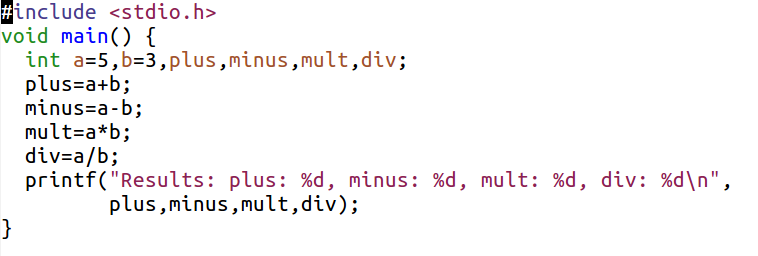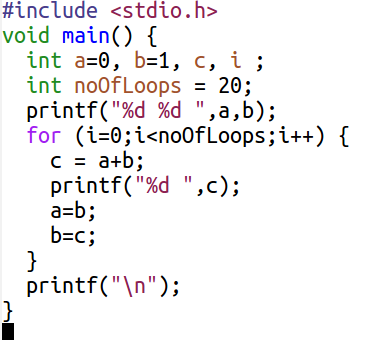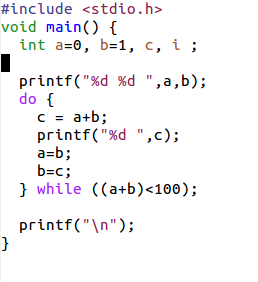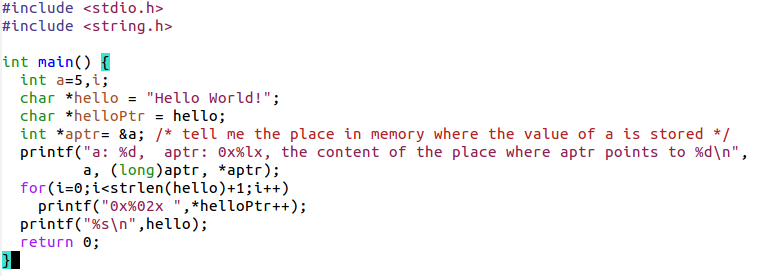
Slide 1: A bit of C programming
Lecture 3
Uli Raich
Slide 2: Programming Languages
To make a language a programming language it needs to implement:- Assignments
- Conditional statements
- loops
Slide 3: C libraries
C uses a large number of code libraries and you can create C libraries yourself. These libraries may use special data types, which are defined in include files Before using the library functions #include <stdio.h> or #include “myOwnIncludeFile.h”Slide 4: The C main program
As a first example people usually write the “Hello World” program
Let us try to compile and execute this program First we start the editor, we type and save the program, then we compile it using the gcc compiler and finally we execute it.
Slide 5: C data types
- C has a number of data types:
- char, short, int, long, float, double
- unsigned char, unsigned short, unsigned int
- can be extended to boolean (in C99 you can #include <stdbool.h>
- No strings! But a pointer to a zero terminated chain of characters
- struct
- union
- enum
Slide 6: Assignments
We modify the program to do some calculation:
Slide 7: Conditions: the if statement
Conditions can be tested with if if (a < b) printf(“a is bigger than b\n”); else printf(“b is bigger than a\n”);Slide 8: Calculating the Fibonacci numbers
The Fibonacci numbers: 0 1 1 2 3 5 8 13 21 34 … or xn = xn-1+xn-2 How can we write a program to calculate up to 12 such numbers? This can easily be done in a for loopSlide 9: The for loop

Slide 10: The while loop
Can we also do calculations as long as the Fibonacci number does not exceed a certain value?
Slide 11: Pointers
We can define variables which do not contain the value but the address of where the value is stored in memory:char a=5; is the value
char *myText=”Hello World!”; myText points to the place in memory where Hello World is stored.
Slide 12: Pointer Example
Slide 13: Command line arguments
The main routine has 2 parameters, which we did not use yet as well as a return code. int main(int argc, char ** argv) or int main(int argv, char *argv[ ]); int argc is the number of arguments passed char **argv is a pointer to a list of null terminated C strings.Slide 14: Command line arguments example
--Comments
| I | Attachment | History | Action | Size | Date | Who | Comment |
|---|---|---|---|---|---|---|---|
| |
assignement.png | r1 | manage | 30.3 K | 2017-09-07 - 14:01 | UnknownUser | |
| |
fibonacci.png | r1 | manage | 30.0 K | 2017-09-07 - 14:05 | UnknownUser | |
| |
hello.png | r1 | manage | 7.4 K | 2017-09-08 - 16:54 | UnknownUser | |
| |
include-1.png | r1 | manage | 5.2 K | 2017-09-07 - 09:17 | UnknownUser | |
| |
include.png | r1 | manage | 5.0 K | 2017-09-07 - 09:17 | UnknownUser | |
| |
lecture_3.odp | r1 | manage | 431.9 K | 2017-09-08 - 17:01 | UnknownUser | |
| |
pointerExample.png | r1 | manage | 40.7 K | 2017-09-07 - 14:11 | UnknownUser | |
| |
question.png | r1 | manage | 16.6 K | 2017-09-07 - 09:17 | UnknownUser | |
| |
questionRes.png | r1 | manage | 8.1 K | 2017-09-07 - 09:18 | UnknownUser | |
| |
structs.png | r1 | manage | 29.3 K | 2017-09-07 - 09:17 | UnknownUser | |
| |
switch-1.png | r1 | manage | 23.2 K | 2017-09-07 - 09:17 | UnknownUser | |
| |
switch-2.png | r1 | manage | 33.6 K | 2017-09-07 - 09:17 | UnknownUser | |
| |
typeCast.png | r1 | manage | 23.7 K | 2017-09-07 - 14:01 | UnknownUser | |
| |
typeError.png | r1 | manage | 10.5 K | 2017-09-07 - 14:01 | UnknownUser | |
| |
while.png | r1 | manage | 25.4 K | 2017-09-07 - 14:08 | UnknownUser |
Ideas, requests, problems regarding TWiki? Send feedback




